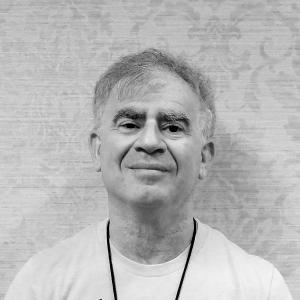Dave Lemberg

Collecting Stories at the National Working Waterfronts and Waterways Symposium 2018
Collecting Stories at the National Working Waterfronts and Waterways Symposium 2018 is a project of Maine Sea Grant, College of the Atlantic, the Island Institute, and the National Working Waterfront Network.
National Capital Contracting
Dave Lemberg is a professor of Geography at Western Michigan University in Kalamazoo, Michigan. His work and research have been primarily focused on water trails in Michigan for the past twenty years. Lemberg's interest in outdoor recreation initially revolved around underground caves, but upon moving to Michigan for his university job, he shifted his focus to water due to the state's extensive navigable waterways. He has been instrumental in developing a Heritage Water Trail program for the state of Michigan and a linear coastal trail on Lake Michigan from Indiana to Wisconsin. His work has not only been academic but also practical, involving the creation of interpretive signs on bridge crossings on the route to educate paddlers about the history, art, and culture of the area. However, a stroke about a year and a half ago has shifted his research interests and perceptions, and he is now focusing on access, particularly the challenges faced by those with mobility issues in getting onto boats.
Scope and Content Note
The interview with Dave Lemberg provides a detailed account of his work and research on water trails in Michigan, his role in developing a Heritage Water Trail program for the state, and a linear coastal trail on Lake Michigan. Lemberg discusses the historical and current state of the waterfront in Kalamazoo, Michigan, where he is based, and the efforts to redevelop it. He also shares his personal journey, including his shift from caving to water-based recreation and research when he moved to Michigan, and how a stroke has impacted his work and shifted his research focus to issues of access for those with mobility issues. The interview also delves into the challenges and successes in developing a state water trail program, including the initial lack of resources and the eventual passage of a bill focusing on history, culture, environment, education, and economic development. The interview provides valuable insights into the importance of water trails in Michigan, the process of developing them, and the challenges faced by those with mobility issues in accessing these trails.
Please Note: The oral histories in this collection are protected by copyright and have been created for educational, research and personal use as described by the Fair Use Doctrine in the U.S. Copyright law. Please reach out Voices@noaa.gov to let us know how these interviews are being used in your research, project, exhibit, etc. The Voices staff can help provide other useful resources related to your inquiry.
The NOAA mission is to understand and predict changes in climate, weather, oceans, and coasts, to share that knowledge and information with others, and to conserve and manage coastal and marine ecosystems and resources. The Voices Oral History Archives offers public access to a wide range of accounts, including historical materials that are products of their particular times, and may contain offensive language or negative stereotypes.
Voices Oral History Archives does not verify the accuracy of materials submitted to us. The opinions expressed in the interviews are those of the interviewee only. The interviews here have been made available to the public only after the interviewer has confirmed that they have obtained consent.
